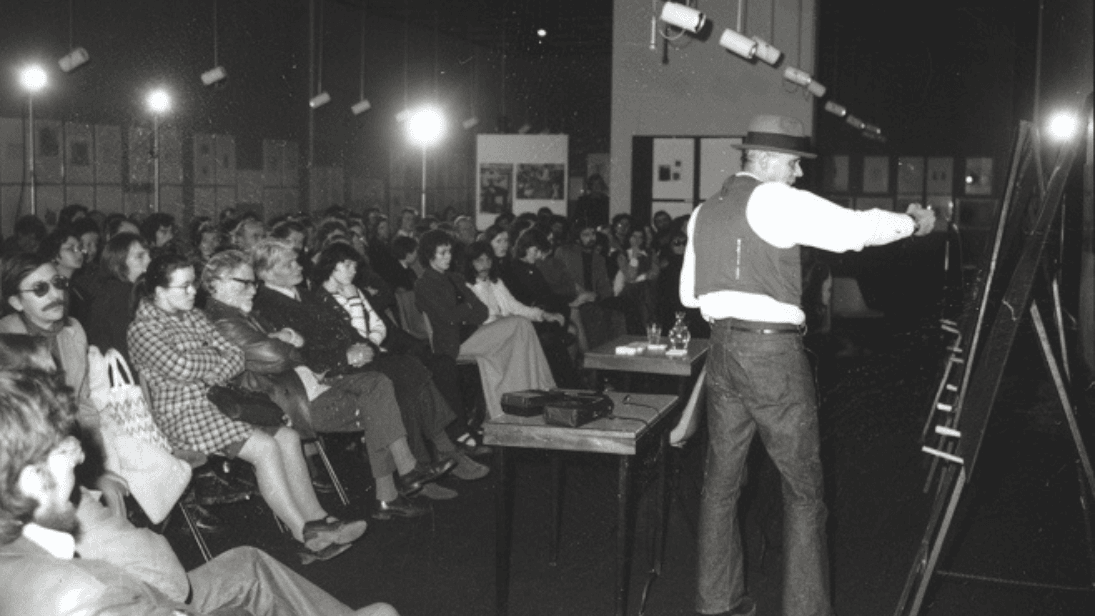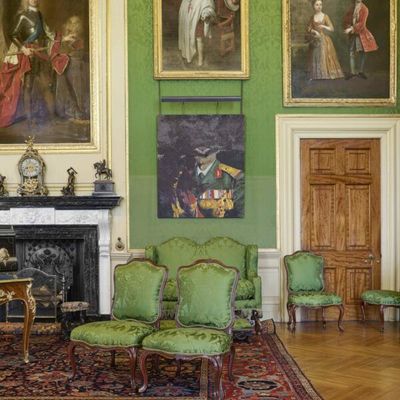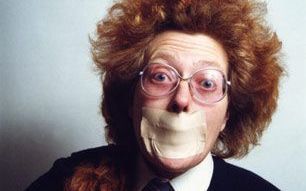NOVEMBER 1974 may be remembered for different reasons, the atmosphere and daily reality of people living locally being very different to our contemporary reality 50 years on.
But for the arts community it's remembered for a different reason. November 18, 1974, was the date that German artist Joseph Beuys gave a performance lecture at the Ulster Museum – one of two lectures he gave in the city at that time. The other one was at Ulster University 's Belfast School of Art. The people still alive who attended these events remember to this day the experience, and its impact is still being felt on the contemporary art scene locally.
Beuys was known known for his chalk and blackboard lectures, and the actual blackboards are currently featured in an exhibition at the Ulster Museum curated by Anna Liesching. Beuys spoke of his art being a social and spiritual practice and was a rare artist at the time as he had a strong religious faith, being a devout and practising Catholic. It now sometimes feels as if somehow the fleeting nature of artificial intelligence and its image-morphing capabilities will take over all art, suppressing the spiritual side of human nature once and for all.
Performance was one of the art forms that redefined art in the post-war era and Beuys' connection with Belfast contributed to sowing seeds that flower in the region today. If performance art is something you have dismissed or found difficulty with in the past, a visit to the exhibition might help with your understanding.
Emeritus Professor Alastair MacLennan, one of the founder members of the Bbeyond performance art organisation, explains the contemporary reality of the time when he came to teach at the Art College while living in East Belfast, and how he introduced the students to this art form. One of his students, the renowned Andre Stitt, used the art form to reflect on his traditional loyalist heritage as he progressed to a career as a Professor at Cardiff University. McLennan highlighted the enduring transformative power of the art form. What his future would have looked like without that experience we will never know.
The Belfast School of Art, as part of their 175-year anniversary, will give a talk featuring Dr Sandra Johnston and Anna Liesching on the enduring legacy of Joseph Beuys. Tickets are free and available on the college website.
Seeds are only seeds unless they are nurtured. One organisation that does that is Bbeyond. Part of Joseph Beuys' legacy is this organisation which has nurtured and supported performance art locally, linking it to the global performance art family.
#artvillage MOCA YINCHUan Commongroundwork building cultural bridges on the Silk Road in North West China pic.twitter.com/Ahq3877E3W
— Bronagh Lawson (@CreativChangeNI) October 15, 2024
My recent visit to China with eight other artists from all over Ireland was conceived and supported by the organisation. It is a continuation of the 'Common Ground Work' which saw Bbeyond invite eight Chinese artists to perform at the Cathedral Quarter Arts Festival earlier this year.
Zara Lyness, Paul Moore, Rebecca Strain, Emma Brennan and myself spent eleven days in Yinchuan in north west China, a city of five million with a large Muslim population. It seemed like we were the only westerners. Brian Patterson, Alex Conway and Kieke Twisselmann took a residency in Chongqing, a city of 23 million inhabitants, and stayed on another week to perform in Chendu at the Up-On Live Art Festival.
With our relatively small population and geographical location it's important to make these international links and nurture artistic talents. And it's an eye-opener to see the change in China over the past 15 years and the possibilities and importance of continuing and strengthening these linkages.
This Bbeyond China work has been supported by a British Council Cultural Collaborations grant and Culture Ireland.
Joseph Beuys, 50 Years Later. Action, Society, Performance and Change is at the Ulster Museum until May 2025.







